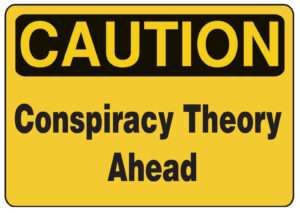The Volokh Conspiracy
Mostly law professors | Sometimes contrarian | Often libertarian | Always independent
Are Right-Wingers More Prone to Believe Conspiracy Theories than Left-Wingers?
An extensive new study finds that the answer is "no." Belief in conspiracy theories is about equally common on different sides of the political spectrum.

There is a common perception that right-wingers are more likely to believe conspiracy theories than people on the left. But a large-scale new study authored by political scientists Adam Enders, Christina Farhart, Joanne Miller, Joseph Uscinski, Kyle Saunders, and Hugo Drochon finds otherwise. Uscinski is a leading expert on public belief in political conspiracy theories. Here is the abstract of their article, published in Political Behavior:
A sizable literature tracing back to Richard Hofstadter's The Paranoid Style (1964) argues that Republicans and conservatives are more likely to believe conspiracy theories than Democrats and liberals. However, the evidence for this proposition is mixed. Since conspiracy theory beliefs are associated with dangerous orientations and behaviors, it is imperative that social scientists better understand the connection between conspiracy theories and political orientations. Employing 20 surveys of Americans from 2012 to 2021 (total n = 37,776), as well as surveys of 20 additional countries spanning six continents (total n = 26,416), we undertake an expansive investigation of the asymmetry thesis. First, we examine the relationship between beliefs in 52 conspiracy theories and both partisanship and ideology in the U.S.; this analysis is buttressed by an examination of beliefs in 11 conspiracy theories across 20 more countries. In our second test, we hold constant the content of the conspiracy theories investigated—manipulating only the partisanship of the theorized villains—to decipher whether those on the left or right are more likely to accuse political out-groups of conspiring. Finally, we inspect correlations between political orientations and the general predisposition to believe in conspiracy theories over the span of a decade. In no instance do we observe systematic evidence of a political asymmetry. Instead, the strength and direction of the relationship between political orientations and conspiricism is dependent on the characteristics of the specific conspiracy beliefs employed by researchers and the socio-political context in which those ideas are considered.
The authors find that conservatives and Republicans are more likely to believe conspiracy theories that fit their predispositions and biases. For example, they are far more likely than liberals and Democrats to believe that the 2020 election was stolen from Donald Trump. But, by the same token, left-wingers are more likely to believe conspiracy theories that fit their biases, such as 9/11 "trutherism" (claims that George W. Bush knew about the 9/11 attacks in advance and deliberately allowed them to happen). The authors also find that "[t]here are also many conspiracy theories finding equal support among the left and right, including theories involving "chem-trails", the moon landing, fluoridated water, Freemasons, lizard people, and television mind control, to name a few." When a conspiracy theory doesn't have a strong political valence, left and right are usually about equally prone to believe it.
Sometimes conspiracy theories shift valence over time. For example, belief in anti-vaxxer conspiracy theories was about equally common before Covid, but has acquired a right-wing orientation since then. The career of Robert F. Kennedy, Jr. - who used to peddle anti-vaccine conspiracy theories primarily to the left, but now caters more to the right - is a an example of the shift.
This is far from the first study of the distribution of beliefs in conspiracy theories. But it is notable for its extensive scope. It adds to the already extensive evidence that political ignorance and misinformation are serious problems across the political spectrum, not just on the right.
While right-wing susceptibility to conspiracy theories may not be generally greater than that of the left, it can nonetheless be a more severe danger at any given point in time. Right now, widespread conservative/Republican endorsement of Donald Trump's "big lie" about the 2020 election is a greater menace than any currently prevalent left-wing conspiracy theory, because it incentivizes potential future GOP efforts to reverse election results they don't like, and could lead to more violence like that which occurred on January 6, 2021.
But we can recognize the urgency of that issue without falling into the trap of thinking that ignorance, misinformation, and conspiracy-mongering are only significant problems on one side of the political spectrum. Sadly, that just isn't true.
Acknowledging the bipartisan, cross-ideological nature problem is not enough to solve it. But it's at least a good start. I assess a variety of potential ways to mitigate political ignorance and misinformation in this recent article and in my book Democracy and Political Ignorance.


Show Comments (132)